APA | Chicago | MLA
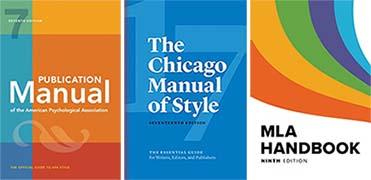 The Douglas College Archives is home to a wide variety of materials you may wish to draw upon as sources for a term paper. The fact that most archival records are unpublished materials (primary sources) does not change the need to cite them in your written work the way you would a book or journal article. As with these more common sources, a major reason for citing archival materials is to enable readers to track down the sources themselves. This means that APA, Chicago, and MLA documentation styles all include information about the physical location of archival materials in a given repository — typically reference numbers for the collection (or in our case the series), the box, and the file where an item is stored.
The Douglas College Archives is home to a wide variety of materials you may wish to draw upon as sources for a term paper. The fact that most archival records are unpublished materials (primary sources) does not change the need to cite them in your written work the way you would a book or journal article. As with these more common sources, a major reason for citing archival materials is to enable readers to track down the sources themselves. This means that APA, Chicago, and MLA documentation styles all include information about the physical location of archival materials in a given repository — typically reference numbers for the collection (or in our case the series), the box, and the file where an item is stored.
The examples below reflect the most common formats you will encounter at the Douglas College Archives, however, this is not an exhaustive list. Consult the full style guide for information about citing formats not included on this page.
In-text citations should include both the author and the date. This information can be incorporated into the prose of your written work or as a parenthetical citation. The name and date in a parenthetical citation is separated by a comma.
|
Citation in prose
Editor Leona Gom petitioned Douglas College to save EVENT Magazine when Kwantlen College announced plans to cease funding at the end of the fiscal year (1985).
Parenthetical citation
Staff and advocates of EVENT Magazine petitioned Douglas College to save the publication when its funding was unexpectedly cancelled (Gom, 1985).
|
If the author or creator is unknown or not named you should instead use the title or description of the work and the year. If the title is italicized or in quotation marks, do the same with your in-text citation.
|
Citation in prose
In promotional materials like “Your Future... Fulfillment or Frustration?” women were invited to attend brainstorming sessions and panel discussions throughout the fall 1974 semester.
Parenthetical citation
Women were invited to various events at the college including brainstorming sessions and panel discussions (“Your Future... Fulfillment or Frustration?”, 1974).
|
Sources: APA Style - Archival Documents and Collections. (Available only on the APA Style website, not the manual.) The Douglas College Library also has copies of the APA Style Manual, 7th Edition.
Archival textual record
Reference
Author, A.A. (Year). Description of the materials. Collection or series (Series number, box/file/item number, etc), Name of repository, location.
Zimmerman, L. (1976). Brochure for Occupation Housewife event. Women's Studies (Series S-008, Box 118, File F-118-22), Douglas College Archives, New Westminster, British Columbia, Canada.
-
If the author is not stated in the document but can be discerned with reasonable certainty, include "(presumed)." between the author's name and the date.
-
If the date is not stated in the document but can be discerned with reasonable certainty, include the abbreviation "ca." before the year inside the parentheses.
Letter
Reference
Author, A.A. (Year, Month Day). [Description of letter]. Name of repository (Series number, box/file/item number, etc), Name of repository, location.
Wootton, G. (1974, December 2). [Letter to B.C. Civil Liberties Association]. Douglas College Archives (Series S-002, Box 295, File F-295-12), New Westminster, British Columbia, Canada.
Archival source with group author
Reference
Name of group. (Year, Month Day). Title or description of document. Collection or series (Series number, box/file/item number, etc), Name of repository, location.
Learning Resources Public Services Committee. (1986, April 4). Meeting minutes of Learning Resources Public Services Committee. Library/Learning Resources series (S-019, Box 102, File F-102-05), Douglas College Archives, New Westminster, British Columbia, Canada.
Archival photograph
Reference
Photographer. (Year). Title of photograph. Collection or series (Series number, box/file/item number, etc), Name of repository, location.
Public Information Office. (1983). New Westminster campus interior near end of construction. MCO Photo Collection (678-009-002), Douglas College Archives, New Westminster, British Columbia, Canada.
- If the photograph does not have a title, provide a bracketed description instead.
Archival photograph, no author and no title
Reference
[Description of photograph]. (Year). Collection or series (Series number, box/file/item number, etc), Name of repository, location.
[Photograph of Anthony Wilkinson]. (ca. 1981). Publicity, Marketing and Communications series (Series S-010, Box 289, File F-289-01), Douglas College Archives, New Westminster, British Columbia, Canada.
Poster, flyer, or other graphic material
Reference
Creator. (Year). Title of work. Collection or series (Series number, box/file/item number, etc), Name of repository, location.
Public Information Office. (1990). A Request for Photographs. Twentieth Anniversary series (Series S-012, Box 214, File F-214-01), Douglas College Archives, New Westminster, British Columbia, Canada.
Unlike APA and MLA, the Chicago Manual of Style uses footnotes and/or end notes for citations. Information pertaining to archival sources is located in the manual’s section on Manuscript Collections.
Source: The Chicago Manual of Style, 17th Edition. Available at the Douglas College Library.
Archival textual record
Note
1. Title or description of item, date, name of collection or series, reference code, Name of repository, location.
1. Brochure for Occupation Housewife event, 12 January 1976, Women’s Studies, series S-008, box 118, file F-118-22, Douglas College Archives, New Westminster, British Columbia.
Bibliography
Last Name, First Name of author. Collection or series name. Name of repository. Location.
Zimmerman, Lillian. Women’s Studies. Douglas College Archives. New Westminster, British Columbia.
- If there is no known or specified author or creator, the bibliography entry for any format of archival source begins with the name of the collection or series.
Letter
Note
2. Description of letter, date, name of collection or series, reference code, Name of repository, location.
2. Letter from George Wootton to the BC Civil Liberties Association, 2 December 1974, Principal’s Papers, series S-002, box 295, file F-295-12, Douglas College Archives, New Westminster, British Columbia.
Bibliography
Last Name, First Name of author. Collection or series name. Name of repository. Location.
Wootton, George. Principal's Papers. Douglas College Archives. New Westminster, British Columbia.
Archival photograph
Note
3. Title or description of photograph, date, name of collection or series, reference code, Name of repository, location.
3. Photograph of Anthony Wilkinson, 1981, Publicity, Marketing and Communications, series S-010, box 289, file F-289-01, Douglas College Archives, New Westminster, British Columbia.
Bibliography
Last Name, First Name of photographer. Collection or series name. Name of repository. Location.
Publicity, Marketing and Communications. Douglas College Archives. New Westminster, British Columbia.
Poster, flyer, or other graphic material
Note
4. Title or description of material, date, name of collection or series, reference code, name of repository, location.
4. “A Request for Photographs,” 1990, Twentieth Anniversary, series S-012, box 214, file F-214-01, Douglas College Archives, New Westminster, British Columbia.
Bibliography
Last Name, First Name of creator (if known). Collection or series name. Name of repository. Location.
Public Information Office. Twentieth Anniversary. Douglas College Archives. New Westminster, British Columbia.
In-text citations should begin with the shortest piece of information that directs a reader to the relevant entry in your Works Cited section. This citation could be in the prose of your written work or as a parenthetical citation.
|
Citation in prose
George Wootton voiced his support for their work in a letter to the organization.
Parenthetical citation
There was institutional support for the BC Civil Liberties Association at the highest levels of the College (Wootton).
|
Although page numbers are a second component to MLA citations, many archival sources do not have page numbers, in which just the creator's name or surname is sufficient. If the same creator has more than one entry in your Works Cited page, you should include the year of creation in your prose or parenthetical citation.
|
Citation in prose
The Institute of Environmental Studies first discussed the Mud Bay case study during a meeting in 1970
Parenthetical citation
The Mud Bay ecosystem was among the first cases investigated by faculty the College (Institute of Environmental Studies, 1970).
|
Source: MLA Handbook, Ninth Edition. Available at the Douglas College Library.
Archival textual record
Works Cited
Last name, First name of author. Title or description of document. Day Month Year. Title of series, Name of repository, Location, series number, box, folder. Format.
Zimmerman, Lillian. “Operation Housewife.” 1976. Women’s Studies, Douglas College Archives, New Westminster, British Columbia, S-008, box 118, F-118-22. Brochure.
- Titles should be in quotation marks.
- For most textual materials, the format “Manuscript” is sufficient. The terms Brochure, Pamphlet, and Press Release can be used in place of Manuscript where relevant.
Letter
Works cited
Last name, First name of author. Description of letter. Day Month Year. Title of series, Name of Repository, Location, series number, box, folder number. Manuscript.
Wootton, George. Letter to BC Civil Liberties Association. 2 Dec. 1974. Principal’s Papers, Douglas College Archives, New Westminster, British Columbia, S-002, box 295, F-295-12. Manuscript.
Archival photographs
Works Cited
Last name, First of photographer. Title or description of photograph. Day Month Year, Title of series, series number, box, folder number, Name of repository, Location.
Public Information Office. Photograph of Anthony Wilkinson. 9 Apr. 1981, Publicity, Marketing and Communications, S-010, box 289, F-289-01, Douglas College Archives, New Westminster, British Columbia.
- Titles should be in italics.
Poster, flyer, or other graphic material
Works Cited
Last name, First name of creator. Title or description of material. Year. Title of series, Name of repository, Location, series number, box, folder. Format.
Public Information Office. “A Request for Photographs.” 1990. Twentieth Anniversary, Douglas College Archives, New Westminster, British Columbia, S-012, Box 214, F-214-01. Flyer.
- Titles should be in quotation marks.
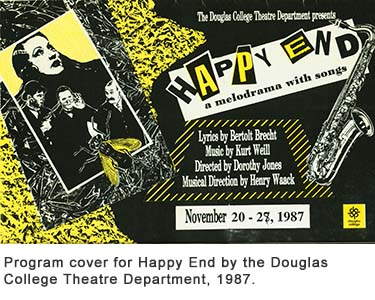 The Douglas College Archives preserves the college’s own archives and collects archives of related individuals and organizations. The institution holds unique, unpublished materials in a variety of formats, including correspondence and committee records, photographs, and ½-inch video reels. The acquisition of material is governed by College policy.
The Douglas College Archives preserves the college’s own archives and collects archives of related individuals and organizations. The institution holds unique, unpublished materials in a variety of formats, including correspondence and committee records, photographs, and ½-inch video reels. The acquisition of material is governed by College policy.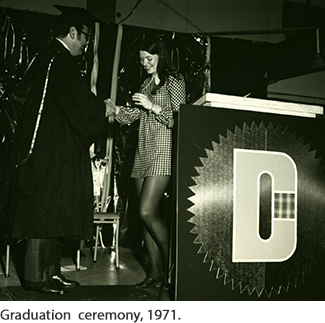 The Douglas College Archives supports the administrative and educational needs of students, instructors, and staff in a variety of ways. Services include:
The Douglas College Archives supports the administrative and educational needs of students, instructors, and staff in a variety of ways. Services include: Archives Digitization Request Form and we will complete your request as soon as possible. Researchers are welcome to make their own copies using their digital camera or cell phone. Archives staff, subject to equipment restrictions and capacity limitations, offer in-house copying/scanning to current employees and students. Commercial use of materials may be subject to a fee. If you wish to use archival materials as part of a for-profit venture, please contact the Archives to discuss your project and possible fees associated with the reproduction of our material.
Archives Digitization Request Form and we will complete your request as soon as possible. Researchers are welcome to make their own copies using their digital camera or cell phone. Archives staff, subject to equipment restrictions and capacity limitations, offer in-house copying/scanning to current employees and students. Commercial use of materials may be subject to a fee. If you wish to use archival materials as part of a for-profit venture, please contact the Archives to discuss your project and possible fees associated with the reproduction of our material.
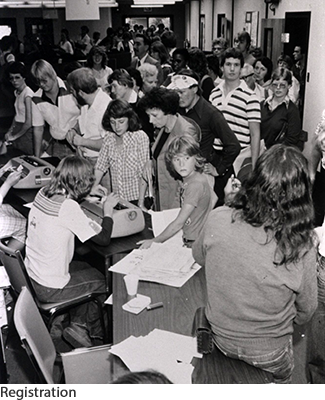 Conducting research
Conducting research The Douglas College Archives is home to a wide variety of materials you may wish to draw upon as sources for a term paper. The fact that most archival records are unpublished materials (primary sources) does not change the need to cite them in your written work the way you would a book or journal article. As with these more common sources, a major reason for citing archival materials is to enable readers to track down the sources themselves. This means that APA, Chicago, and MLA documentation styles all include information about the physical location of archival materials in a given repository — typically reference numbers for the collection (or in our case the series), the box, and the file where an item is stored.
The Douglas College Archives is home to a wide variety of materials you may wish to draw upon as sources for a term paper. The fact that most archival records are unpublished materials (primary sources) does not change the need to cite them in your written work the way you would a book or journal article. As with these more common sources, a major reason for citing archival materials is to enable readers to track down the sources themselves. This means that APA, Chicago, and MLA documentation styles all include information about the physical location of archival materials in a given repository — typically reference numbers for the collection (or in our case the series), the box, and the file where an item is stored.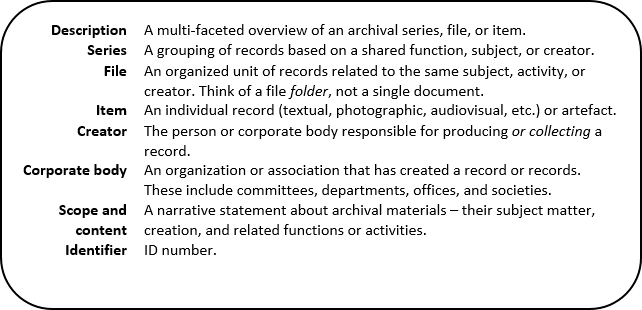



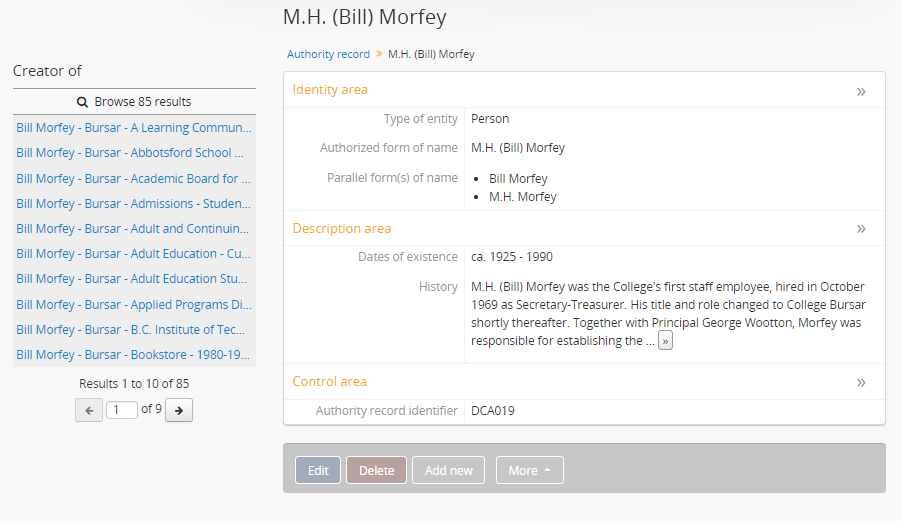
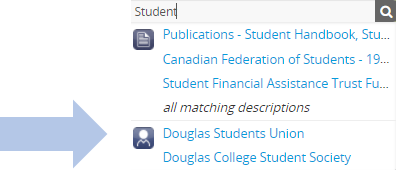 When you type keywords into the search bar at the top of the page and hit 'enter', the database will pull results from throughout the Archives. By default, those results will be archival descriptions rather than authority records, subject access points, or place access points. However, as you type in the search bar a dropdown menu will appear with possible options that include these additional elements from the database.
When you type keywords into the search bar at the top of the page and hit 'enter', the database will pull results from throughout the Archives. By default, those results will be archival descriptions rather than authority records, subject access points, or place access points. However, as you type in the search bar a dropdown menu will appear with possible options that include these additional elements from the database.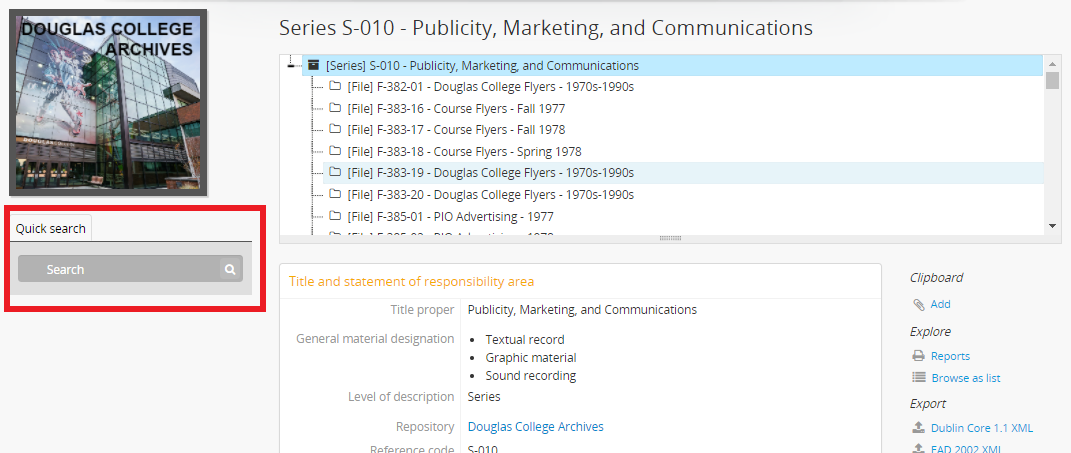

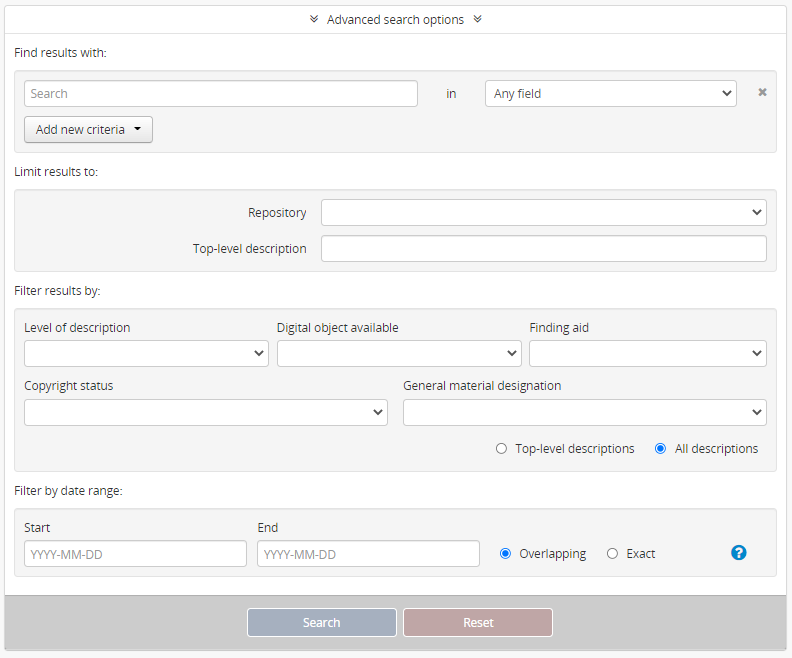
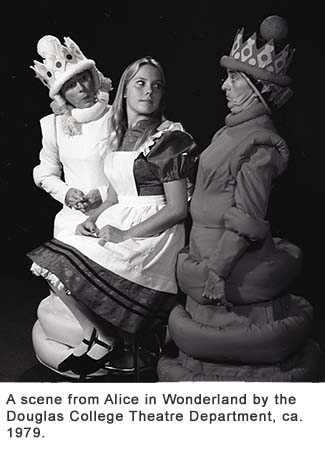 As an institutional repository, the Douglas College Archives seeks to collect and preserve records of permanent value. These are materials that document the College’s creation and development, historical memory, and ongoing activities central to who we are as an organization and educational community.
As an institutional repository, the Douglas College Archives seeks to collect and preserve records of permanent value. These are materials that document the College’s creation and development, historical memory, and ongoing activities central to who we are as an organization and educational community.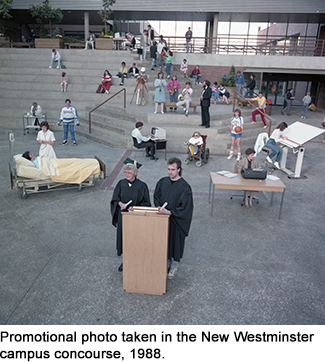 Started more than two decades ago by the Archives Association of British Columbia, Archives Awareness Week is an annual celebration of some 200 archives in the province. Its aim is to bring public recognition to the importance of these institutions as places where diverse and complex histories are preserved. At the Douglas College Archives we preserve the College's institutional memory through our collection of unique and unpublished materials that include photographs, maps, blueprints, audio tapes, video, meeting minutes, newsletters, correspondence, and so much more!
Started more than two decades ago by the Archives Association of British Columbia, Archives Awareness Week is an annual celebration of some 200 archives in the province. Its aim is to bring public recognition to the importance of these institutions as places where diverse and complex histories are preserved. At the Douglas College Archives we preserve the College's institutional memory through our collection of unique and unpublished materials that include photographs, maps, blueprints, audio tapes, video, meeting minutes, newsletters, correspondence, and so much more!